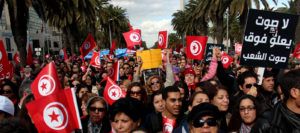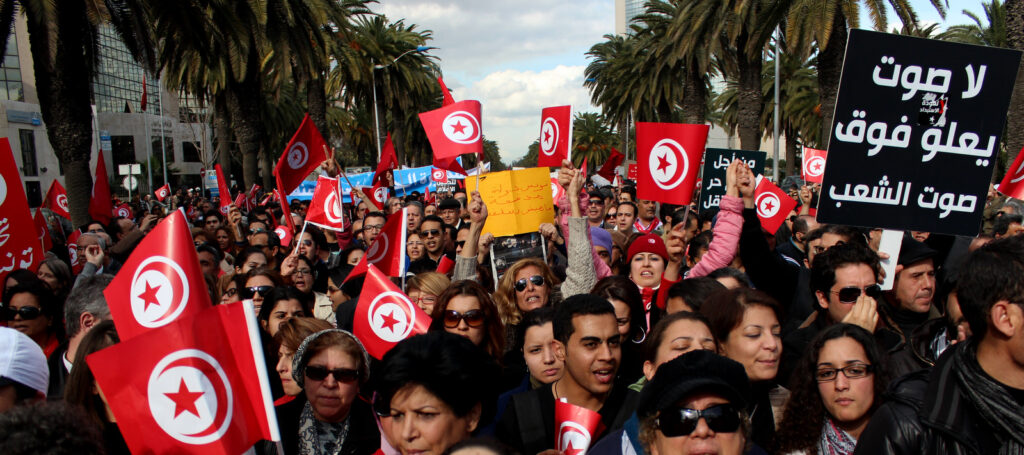
While Syria, Libya, and Yemen still face violent conflict as a result of the 2011 uprisings, Tunisia has been lauded as the one success story of the Arab Spring. So when protests broke out in December 2017, continuing on throughout the month of January, and were met with a severe reaction from the government, the world took notice; was the one success story about to unravel? Would we see a return to the days of President Ben Ali’s violent dictatorship?
In late 2010, Tunisian street peddler Mohamed Bouazizi set himself ablaze in the small town of Sidi Bouzid, triggering uprisings both in his own country and across the region. What cause led a street peddler to sacrifice his own life? What latent injustice led his country to internalize his sacrifice and protest a government that in turn would not hesitate to use its security force to violently suppress them? The protests that would soon grip Tunisia were not just about one man’s gesture; indeed, they were rooted in long-held resentments that were felt throughout the country. Specifically, corruption, economic challenges, and ever-decreasing freedom of the press served as significant driving forces in Tunisia’s revolution.
The passion that drove these protests proved successful. On January 14, 2011, President Ben Ali resigned after 24 years in office and left the country. Still, this was no guarantee that the country was headed in a new, democratic direction; indeed, in neighboring countries that followed Tunisia’s example in the greater wave of Arab Spring uprisings, bloody civil war or dictatorial resurgence have been the rule. However, Tunisia forged ahead towards democracy. The people began crafting a new constitution, at times halted by disagreement. It was their neighboring countries’ ensuing destruction that pushed leaders to compromise on these disagreements and address the most divisive issues. And under this new constitution, Tunisians have been able to engage in the political process for the first time in decades.
The success of the new constitution and the beginnings of democracy have not curtailed severe economic challenges, which again have served as the principal force for more recent protests. In late December, around the seventh anniversary of the original 2011 protests, Tunisians again took to the streets. Since the revolution, nine successive governments have been unable to prevent unemployment from rising to 15.3%. The second installment of a $2.9 billion IMF loan was frozen in 2017 in response to the government’s failure to sufficiently reform state finances. Terrorist attacks have also contributed to Tunisia’s economic floundering.
Prime Minister Youssef Chahed’s response in early December—a reform budget of austerity to trim deficits and stimulate growth through deducted subsidies, a reformed pension system, and a reduced public sector—was predicted to fuel even more unrest in the new year. Sure enough, people took to the streets soon after the implementation of the tax and prices hikes on January 1. Protests continued throughout January, eventually culminating in the use of tear gas against demonstrators, the arrests of around 800 people, and the death of one protester.
The government’s fairly heavy-handed reaction has been met with concern by the global community. The UN human rights office expressed concern over the number of those arrested and cautioned Tunisian authorities to maintain rights to freedom of expression and peaceful assembly. Indeed, considering the backslide into autocracy in other countries, such repressive tactics are cause for concern, and Tunisians are certainly justified in their frustration. One demonstrator, Issam Chahbani, noted that “There is a feeling of injustice and marginalization here … We’re only asking for jobs and development.” Tunisians feel lost, disheartened by an economic situation that has only worsened since Ben Ali’s departure while the government responds to protests with force reminiscent of Ben Ali’s dictatorship.
The government did promise reforms in response to agitation, though these measures did little to comfort protestors. Government pledges included extra aid for poor families, a review of retirement disbursements that have been underpaid, and the extension of health-care to all Tunisians. President Beji Caid Essebi also visited a neighborhood in Tunis to announce a new youth center. But in spite of these promises, protests continued on throughout January, indicating the populace’s doubts about the government’s ability to follow through and effect significant economic recovery.
These recent events are cause to reflect on the one “success” of the Arab Spring. For all the progress towards stable democracy, the government’s inability to provide economic security to its citizens has severely crippled its ability to create a stable and prosperous society. The Tunisia that has been dreamed of since protests erupted in 2010 does not seem much closer today.
Yet, despite the enumerated reasons for misgivings about Tunisia’s viability as a stable, democratic state, it is not time to give up on this Arab Spring success story. Protests similar to those last month have been common since 2011, and, though recent protests resulted in excessive arrests and some use of force, there has not been a significant return to the extreme repressive tactics of Ben Ali’s regime. Indeed, the very fact that these protests have continued each year indicates that Tunisians are allowed to speak out and express their grievances against the government, a dramatic shift from Ben Ali’s strict policy against any dissidence.
Another sign of hope is President Essebsi’s commitment to progress for women. Last year he lifted the ban on Muslim women marrying men outside their faith, and this year he is expected to make Tunisia the first Muslim country to grant equal inheritance to men and women. Though such steps may not seem particularly revolutionary, they are signals of the government’s response to a strong women’s movement in Tunisia. It remains to be seen if Essebsi and his government can execute when it comes to his people’s wishes for economic stability and prosperity.
The views expressed by the author do not necessarily reflect those of the Glimpse from the Globe staff, editors or governors.







